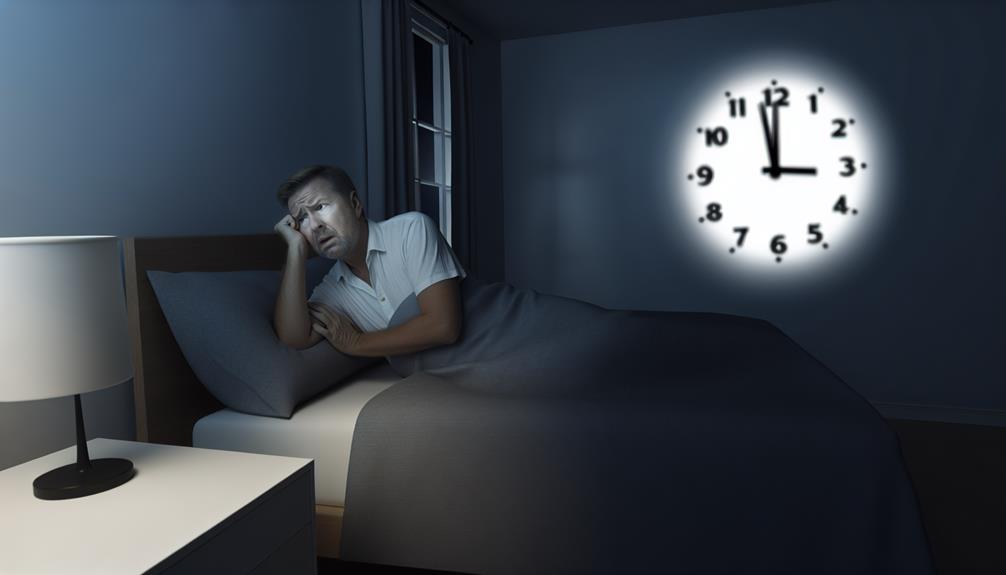If you're over 50, you might notice symptoms of hormonal imbalance like fatigue, reduced libido, and mood swings. I've seen that many men experience muscle mass decline and weight gain, often linked to decreasing testosterone levels. Sleep disturbances, such as insomnia, also tend to emerge, impacting overall well-being. Cognitive changes, including memory lapses and difficulty concentrating, can further complicate these issues. It's vital to address these symptoms with a healthcare professional who can help identify specific hormonal disruptions and recommend appropriate management strategies. Understanding these symptoms can be the first step toward improving your quality of life.
Common Hormonal Changes

Many men over 50 experience common hormonal changes that can greatly impact their health and well-being. As I've discovered, these changes are primarily due to the decline in testosterone levels, which plays a significant role in hormonal regulation and overall endocrine health. This decline often starts gradually, leading to symptoms that may not seem directly linked to hormonal shifts at first.
Testosterone isn't the only hormone affected; estrogen and DHEA levels can also fluctuate. These hormonal changes may result in a range of symptoms, including alterations in mood, libido, and muscle mass. I've noticed that the balance between testosterone and estrogen becomes particularly important as I age. An imbalance can lead to increased body fat and reduced energy levels, which can further exacerbate feelings of frustration and dissatisfaction.
Understanding the mechanisms behind these changes is essential. The endocrine system, responsible for hormone production and regulation, can become less efficient with age. This inefficiency can lead to a cascade of issues affecting not just physical health, but psychological well-being as well. I've learned to pay attention to these symptoms and consider them as potential indicators of hormonal imbalance.
If you or someone you know is experiencing these changes, it's important to consult with a healthcare professional who specializes in hormonal health. They can provide guidance on managing these shifts, ensuring that you maintain ideal health and quality of life as you navigate this stage of life.
Fatigue and Low Energy
As I've observed in my own experience and through discussions with peers, fatigue and low energy are prevalent symptoms of hormonal imbalance in men over 50. This decline in energy can notably affect day-to-day activities and overall quality of life. Low testosterone levels, often linked to hormonal imbalance, can lead to a feeling of persistent tiredness, making even simple tasks seem intimidating.
To better understand the various factors contributing to fatigue, I've compiled the following table that highlights potential causes and corresponding lifestyle adjustments or natural remedies:
| Factor | Impact on Energy | Suggested Remedies |
|---|---|---|
| Hormonal Changes | Decreased energy | Consult a healthcare provider |
| Poor Sleep Quality | Increased fatigue | Establish a bedtime routine |
| Nutritional Deficiencies | Low energy levels | Incorporate a balanced diet |
| Sedentary Lifestyle | Reduced stamina | Engage in regular physical activity |
| Stress and Anxiety | Mental fatigue | Practice mindfulness techniques |
Implementing lifestyle adjustments can be essential. Regular exercise, a balanced diet rich in antioxidants, and adequate hydration can enhance overall energy levels. Additionally, exploring natural remedies, such as herbal supplements or vitamins, might support hormonal health.
Addressing fatigue and low energy isn't just about acknowledging the issue; it's about taking actionable steps to improve one's energy. Recognizing these symptoms is the first step toward reclaiming vitality and enhancing life quality.
Mood Swings and Irritability

As I've experienced hormonal imbalances, I've noticed significant mood swings and irritability that can arise from various underlying causes. These changes not only affect my emotional well-being but also strain my relationships with those around me. Understanding these impacts and exploring management strategies can help mitigate these symptoms effectively.
Causes of Mood Changes
When it comes to mood changes in men over 50, hormonal fluctuations often play an important role. As testosterone levels decline, I've noticed that hormonal triggers can lead to increased irritability and mood swings. This isn't just about testosterone; other hormones like cortisol and estrogen also fluctuate. Elevated cortisol levels, often linked to stress, can exacerbate feelings of anxiety and irritability.
Additionally, lifestyle factors can greatly contribute to these mood changes. Poor diet, lack of exercise, and insufficient sleep can create a vicious cycle that further disrupts hormonal balance. For instance, when I don't get enough sleep, my body produces more cortisol, which can make me feel on edge. Similarly, a diet high in sugar and processed foods can lead to energy crashes that affect my mood.
It's essential to recognize how these hormonal triggers and lifestyle factors interplay. By addressing these issues, I can work towards achieving a more stable mood. Understanding the root causes of mood changes is vital, not just for personal well-being, but also for maintaining overall health as I navigate through my 50s and beyond.
Impact on Relationships
Mood swings and irritability stemming from hormonal imbalances can markedly affect relationships, particularly for men over 50. I've noticed that these emotional fluctuations often lead to communication breakdowns with my partner. When I'm feeling irritable, it's easy to misinterpret their intentions, creating an emotional disconnect that can escalate into arguments. This relationship strain not only affects our day-to-day interactions but can also lead to intimacy issues, where affection feels distant.
As I grapple with these mood changes, I find that trust challenges arise. My partner may question my feelings, which complicates our partnership dynamics. It's essential to acknowledge that these emotional shifts can create an environment where conflict resolution feels nearly impossible. Without effective communication, misunderstandings fester, further entrenching the divide between us.
Building strong support systems is important during this time. By seeking understanding and expressing my feelings, I'm taking steps to counteract these challenges. Acknowledging these hormonal impacts can pave the way for healthier interactions and foster resilience in our relationship. Ultimately, recognizing and addressing these issues is crucial for maintaining the connection and intimacy we both value.
Management Strategies Available
Finding effective management strategies for mood swings and irritability related to hormonal imbalances is essential for maintaining emotional stability and healthy relationships. One approach I've found beneficial involves dietary adjustments. Incorporating omega-3 fatty acids and reducing processed sugars can positively influence mood. Coupled with consistent exercise routines, I've noticed improvements in my overall well-being. Regular physical activity not only enhances mood but also supports hormonal balance.
Stress management techniques are imperative. I practice mindfulness practices, such as meditation and deep-breathing exercises, which help me remain centered during turbulent times. Additionally, prioritizing sleep hygiene has made a significant difference; quality sleep is essential for emotional regulation.
For some, hormone therapy may be necessary, and I recommend discussing this option with a healthcare provider. Nutritional supplements, like vitamin D and magnesium, can also support mood stability, but it's best to consult a professional before starting any new regimen.
Ultimately, making thorough lifestyle changes that include these strategies can profoundly impact managing mood swings and irritability, leading to a more balanced and fulfilling life. By implementing these adjustments, I've taken important steps toward emotional well-being.
Changes in Libido
As men over 50, I've noticed that changes in libido can be a significant indicator of hormonal imbalance. Decreased sexual desire and erectile dysfunction issues often accompany fluctuations in mood and energy levels. Understanding these symptoms is essential for addressing overall health and well-being.
Decreased Sexual Desire
Decreased sexual desire, often referred to as a decline in libido, can greatly impact men over 50. As I've noticed in myself and others, this decline isn't just about physical changes; it carries emotional and relational consequences. Hormonal fluctuations, particularly reduced testosterone levels, can lead to intimacy challenges that affect daily life. I've found that what once felt natural and spontaneous can become a source of stress and frustration.
This change can also create relationship strain. Partners may feel rejected or confused when intimacy diminishes, leading to misunderstandings and tension. I've experienced conversations that revolve around feelings of inadequacy or concern, which can further complicate the dynamics of a relationship. The emotional toll can be just as significant as the physical aspects.
It's essential to recognize that these challenges are not uncommon, and many men face similar experiences. Seeking professional guidance can provide clarity and strategies for addressing these issues. Open communication with a partner is equally important. Together, we can navigate this phase of life, fostering understanding and connection despite the changes in libido.
Erectile Dysfunction Issues
While many men over 50 may expect some changes in their sexual health, the onset of erectile dysfunction can be particularly concerning. I've noticed that this issue often correlates with declining testosterone levels, which can greatly affect my libido and overall sexual performance. It's essential to understand that erectile dysfunction isn't just a natural part of aging; it can be a symptom of hormonal imbalance.
Consider the following factors that can influence erectile dysfunction:
| Factor | Impact on Erectile Dysfunction |
|---|---|
| Decreased testosterone levels | Can lead to reduced sexual desire |
| Stress and anxiety | May cause or exacerbate the issue |
| Poor circulation | Impairs blood flow necessary for erection |
| Medications | Some can affect sexual health negatively |
| Lifestyle choices | Alcohol, smoking, and diet can play a role |
For those of us facing these challenges, testosterone therapy may help restore hormonal balance and improve sexual health. Addressing erectile dysfunction is vital, not just for intimacy, but also for maintaining self-esteem and emotional well-being. If you're experiencing these symptoms, consulting a healthcare provider could be the first step towards regaining confidence in your sexual health.
Mood and Energy Fluctuations
Hormonal fluctuations can considerably impact mood and energy levels in men over 50, often leading to noticeable changes in libido. This can manifest as feelings of irritability, fatigue, or a lack of motivation, all of which may contribute to a diminished interest in sexual activity. Understanding these shifts is essential for addressing them effectively.
Here are three key aspects to reflect on:
- Recognizing Triggers: It's helpful to identify situations or stressors that exacerbate mood swings. Noticing patterns can aid in managing stress more effectively.
- Prioritizing Stress Management: Implementing stress management techniques, such as mindfulness or exercise, can improve emotional resilience. These practices not only enhance overall well-being but also positively influence libido.
- Seeking Support: Discussing these feelings with a healthcare professional can provide insights and strategies tailored to your specific needs, ensuring that you are not alone in this journey.
Muscle Mass Decline

A noticeable decline in muscle mass often becomes apparent for men over 50, and it can be a notable indicator of hormonal imbalance. As I've navigated this age, I've observed firsthand how essential hormones like testosterone play a fundamental role in muscle preservation. With declining hormone levels, I've noticed not just a loss in strength but also a decrease in overall vitality.
One of the key strategies I've found effective in countering muscle mass decline is resistance training. Engaging in regular resistance exercises has been important in stimulating muscle growth and maintaining strength. I've learned that incorporating a variety of exercises targeting major muscle groups helps in effectively preserving muscle mass. This approach not only combats the physical changes associated with aging but also aids in enhancing metabolism.
Additionally, it's essential to pay attention to nutrition. Adequate protein intake supports muscle repair and growth, and I've made it a point to include lean proteins in my diet. I've also discovered that combining resistance training with proper nutrition can greatly mitigate the effects of hormonal imbalance.
Weight Gain and Body Fat
As muscle mass declines with age, many men over 50 often notice an increase in weight and body fat. This change in body composition can be attributed to hormonal imbalances, particularly a decrease in testosterone levels. As testosterone drops, I find that not only does muscle mass decrease, but fat accumulation tends to rise, often leading to metabolic syndrome. Metabolic syndrome is characterized by a cluster of conditions, including increased waist circumference, elevated blood pressure, and abnormal cholesterol levels, which can have serious health implications.
To better understand the relationship between hormonal changes and weight gain, here are three key factors to take into account:
- Hormonal Fluctuations: Low testosterone affects how my body processes fat. As a result, I might experience an increase in visceral fat, which is linked to various health risks.
- Insulin Resistance: Hormonal imbalances can lead to insulin resistance, making it harder for my body to regulate blood sugar, ultimately contributing to weight gain.
- Metabolism Changes: With aging, my basal metabolic rate decreases, meaning I burn fewer calories at rest. This further complicates weight management.
Recognizing these factors can help me take proactive steps to address weight gain and body fat. By understanding the impact of hormonal imbalances, I can make informed lifestyle choices to improve my overall health and well-being.
Sleep Disturbances

With the onset of age, many men over 50 experience sleep disturbances that can greatly impact their quality of life. I've noticed that my sleep patterns have changed considerably, often leading to frustration and fatigue during the day. Hormonal imbalances, particularly a decline in testosterone levels, can contribute to these sleep issues.
One prevalent symptom is a decrease in sleep quality. I find that I often struggle to stay asleep throughout the night. Nighttime awakenings have become more frequent, and even minor noises can disrupt my rest. Each time I wake up, it takes longer to fall back asleep, which compounds my feelings of tiredness. This cycle not only affects my mood but also my overall health.
Research indicates that sleep disturbances in older men can be linked to hormonal changes. Testosterone plays a key role in regulating sleep cycles, and lower levels can lead to insomnia or obstructive sleep apnea. I've come to realize that addressing these hormonal issues might improve my sleep quality and reduce those frustrating nighttime awakenings.
Incorporating lifestyle changes, such as regular exercise and a balanced diet, has helped me manage these symptoms. However, it's essential to consult a healthcare professional to explore potential treatments for hormonal imbalance that could lead to better sleep. If you're experiencing similar disturbances, know that you're not alone, and there are steps you can take to improve your sleep quality and overall well-being.
Cognitive Changes
Cognitive changes often accompany the aging process, especially in men over 50, and can be greatly influenced by hormonal imbalances. I've noticed that these changes can manifest in various ways, considerably affecting daily life. For many, the most concerning aspects involve cognitive decline and memory lapses, which can undermine confidence and overall well-being.
Here are three common cognitive changes I've observed:
- Memory Lapses: It's not uncommon to forget where I placed my keys or struggle to recall names of acquaintances. These moments can be frustrating and may signal a deeper issue related to hormonal fluctuations.
- Difficulty Concentrating: I sometimes find it hard to focus on tasks, especially those that require sustained mental effort. This can be particularly challenging in both personal and professional settings, leading to decreased productivity.
- Slower Processing Speed: I've experienced a noticeable delay in my ability to process information. This can make conversations feel more laborious, as I work to keep up with the flow of discussion.
These cognitive changes can be attributed to hormonal imbalances, particularly in testosterone and other related hormones. Addressing these imbalances might not only improve physical health but also enhance cognitive function. If you're experiencing similar symptoms, it's wise to consult with a healthcare professional for evaluation and management options. Understanding the connection between hormones and cognitive health is essential for maintaining quality of life as we age.
Frequently Asked Questions
Can Hormonal Imbalance Affect My Skin Health as I Age?
Absolutely, hormonal imbalance can greatly affect my skin health as I age. I've noticed that fluctuations in hormones can lead to reduced skin elasticity and moisture retention, making my skin appear more saggy and dry. Additionally, I've experienced an unexpected resurgence of acne, which I hadn't dealt with in years. Understanding these aging effects helps me take proactive steps in maintaining my skin's health and appearance as I navigate through these changes.
Are There Natural Remedies for Hormonal Imbalance in Older Men?
When it comes to tackling hormonal imbalances, I've found that you can often kill two birds with one stone by focusing on lifestyle changes and herbal supplements. Incorporating exercise and a balanced diet can work wonders for overall health. Additionally, certain herbal supplements, like ashwagandha and fenugreek, may help regulate hormones. Always consult a healthcare professional before starting anything new, but these natural remedies could be worth considering in your journey.
How Can Diet Influence Hormonal Health in Men Over 50?
Diet plays an essential role in hormonal health, especially as we age. I've found that making mindful food choices can considerably enhance nutrient absorption, which is important for maintaining hormonal balance. Including healthy fats, lean proteins, and plenty of fruits and vegetables helps regulate hormone production. Avoiding processed foods and sugar can also prevent disruptions. Overall, a balanced diet not only supports my hormonal health but improves my overall well-being, too.
Is Hormone Therapy Safe for Men Over 50 With Imbalances?
When considering hormone therapy for men over 50, I find it's essential to weigh the benefits against potential risks. Hormone therapy can be a viable treatment option, but it should be approached cautiously. I've learned that individual health conditions and underlying risks play a significant role in determining safety. Consulting with a healthcare provider is important to tailor the treatment plan and monitor any side effects effectively. Always prioritize informed decision-making.
What Role Does Stress Play in Hormonal Changes for Older Men?
Stress plays a significant role in hormonal changes, particularly through the regulation of cortisol levels. When I experience chronic stress, my body releases excess cortisol, which can disrupt hormonal balance. This imbalance can lead to various issues, including mood swings and decreased energy. Effective stress management techniques, like mindfulness or exercise, can help mitigate these effects and promote healthier hormone levels. It's essential for us to be proactive in managing stress for overall well-being.
